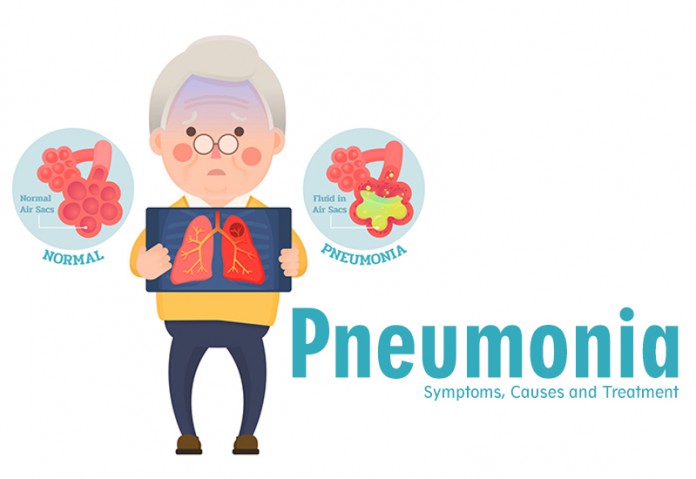Pneumonia is an infection that happens in Air Sacs of one or both lungs. In this infection the air sacs are either get filled with liquid or pus (purulent material). This causes the cough with pus, fever chills and difficulty in breathing. It normally starts with a bacterial, fungal or viral infection. It can occur in young and healthy people but old people or infants with other disease and poor immune system are easy targets.

Important Announcement – EasyShiksha has now started Online Internship Program “Ab India Sikhega Ghar Se”

Pneumonia: Symptoms, Causes and Treatment
Fast facts on pneumonia:
Here are some key points about pneumonia. More detail is in the main article.
-
Pneumonia is an infection of the lungs that can cause mild to severe illness in people of all ages.
-
It is the leading cause of death due to infection in children younger than 5 years of age worldwide.
-
Pneumonia and influenza together are ranked as the eighth leading cause of death in the U.S.
-
Those at high risk for pneumonia include older adults, the very young, and people with underlying health problems.
Common symptoms include:
-
Cough
-
Rusty or green phlegm, or sputum, coughed up from lungs
-
Fever
-
Fast breathing and shortness of breath
-
Shaking chills
-
Chest pain that usually worsens when taking a deep breath, known as pleuritic pain
-
Fast heartbeat
-
Fatigue and weakness
-
Nausea and vomiting
-
Diarrhea
-
Sweating
-
Headache
-
Muscle pain
-
Confusion or delirium, especially in older adults
-
Dusky or purplish skin color, or cyanosis, from poorly oxygenated blood
Top Courses in Software Engineering
Treatment of Pneumonia:
-
Bacterial types of pneumonia are usually treated with antibiotics.
-
Viral types of pneumonia are usually treated with rest and plenty of fluids. Antiviral medications can be used in influenza.
-
Fungal types of pneumonia are usually treated with antifungal medications.
Doctors commonly prescribe over-the-counter (OTC) medications to help manage the symptoms of pneumonia. These include treatments for reducing fever, reducing aches and pains, and suppressing coughs.
In addition, it is crucial to rest and drink plenty of fluids. Staying hydrated helps to thin out thick phlegm and mucus, making it easier to cough up. Hospitalization for pneumonia may be required if symptoms are especially bad or if an individual has a weakened immune system or other serious illnesses. In the hospital, patients are generally treated with intravenous antibiotics and fluids. They may need a supplemental oxygen supply.
Empower your team. Lead the industry
Get a subscription to a library of online courses and digital learning tools for your organization with EasyShiksha
Request NowQ. Are EasyShiksha's internships truly free?
Yes, all internships offered by EasyShiksha are completely free of charge.
Q. How can I apply for an internship with EasyShiksha?
You can apply by visiting our website, browsing available internships, and following the application instructions provided.
Q. What types of internships are available through EasyShiksha?
EasyShiksha offers a wide range of internships across technology, business, marketing, healthcare, and more. Opportunities are continuously updated.
Q. Will I receive a certificate upon completing an internship?
Yes, upon successful completion, you will receive a certificate recognizing your participation and achievements.
Q. Are EasyShiksha's internship certificates recognized by universities and employers?
Yes, the certificates are recognized by universities, colleges, and employers worldwide.
Q. Is the download of certificates free or paid?
Access to internships and courses is free, but there is a small fee to download certificates, covering administrative costs.
Q. When can I start the course?
You can choose any course and start immediately without delay.
Q. What are the course and session timings?
These are fully online courses. You can learn at any time and pace. We recommend following a routine, but it depends on your schedule.
Q. What will happen when my course is over?
After completion, you will have lifetime access to the course for future reference.
Q. Can I download the notes and study material?
Yes, you can access and download course materials and have lifetime access for future reference.
Q. What software/tools would be needed for the course?
All necessary software/tools will be shared during the training as needed.
Q. I’m unable to make a payment. What should I do?
Try using a different card or account. If the problem persists, email us at info@easyshiksha.com.
Q. Do I get the certificate in hard copy?
No, only a soft copy is provided, which can be downloaded and printed if required.
Q. The payment got deducted but shows “failed”. What to do?
Technical errors may cause this. The deducted amount will be returned to your account in 7-10 working days.
Q. Payment was successful but dashboard shows ‘Buy Now’?
Sometimes payment reflection is delayed. If it takes longer than 30 minutes, email info@easyshiksha.com with the payment screenshot.
Q. What is the refund policy?
If you face technical issues, you can request a refund. No refunds are issued once the certificate has been generated.
Q. Can I enroll in a single course?
Yes, select the course of interest, fill in the details, make payment, and start learning. You will also earn a certificate.
Q. My questions are not listed above. I need further help.
Contact us at info@easyshiksha.com for further assistance.
ALSO READ: RPF-si-and-constable-recruitment-exam-date-syllabus-apply
Get Course: Introduction-to-Power-BI







































































